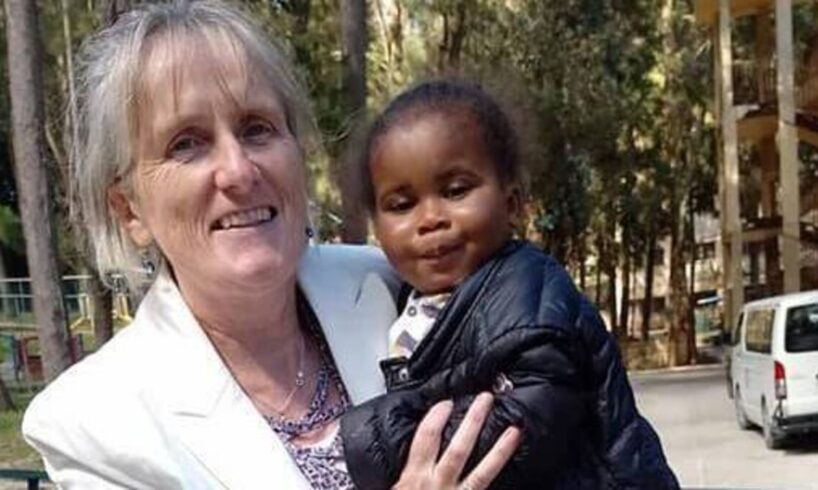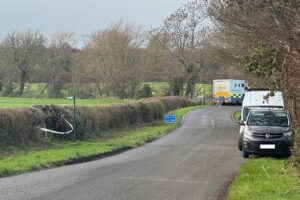
“You can’t run from bullets in a straight skirt.” Those words were recalled by kidnapped humanitarian Gena Heraty in 2023 when she wrote an article for the Mayo News.
It was a reference to a casual conversation with a female work colleague when Gena commented that she looked lovely in her matching skirt and blouse.
Her friend, although flattered, told her that she had carefully chosen the loose-fitting skirt because “it is hard to run from gun fire if you are wearing a straight skirt”.
Gena recalled in her December 2023 article that she would “never look at a skirt in the same way again”.
The exchange offered a brief insight into the heightened awareness of humanitarian workers of the often violent environments where they work.
Ms Heraty, a native of Westport in Co Mayo who is in her mid-50s, was abducted along with seven others and a child from an orphanage in Haiti over the weekend.
She had been overseeing the Sainte-Helene orphanage in the commune of Kenscoff, about 10km southeast of the capital, Port-au-Prince.
The Foyer Sainte-Hélène home for 244 children is in an area that had, until January, been largely untouched by the gang violence that is ripping the country apart and fast bringing it to the point of all-out anarchy.
Kenscoff, which is home to much of the country’s business and political elite, was attacked on January 27 and surrounded by heavily armed gangs.
More than 40 people – including pastors, teachers and children – died during the first eight days of violence, which saw gunmen – some of whom were just teenagers – going from house to house firing at people indiscriminately.
The attack marked the start of an ongoing bid ever since by gangs to seize more territory from Haiti’s Transitional Presidential Council.
The council was sworn in on a non-renewable mandate, which expires in February next year, just days after acting prime minister Ariel Henry resigned in April 2024.
In office since the July 2021 assasination of Haitian president Jovenel Moïse, Ariel Henry had repeatedly postponed a general election he had promised.
Gena Heraty (right). What started as a six-month placement in Haiti in June 1993 turned into a lifetime commitment. Photo: NPH Haiti Special Needs Programs/Facebook
His resignation was forced by gang boss Jimmy “Barbecue” Chérizier, who heads a coalition of gangs in Haiti known as Viv Ansanm.
The former police officer has said that he would consider putting down his arms if he was involved in the formation and part of the next government.
Attacks by Viv Ansanm in Kenscoff after January have included one in April when police were attacked, vehicles set on fire and tactical gear stolen.
That same month, the UN warned that Haiti, the poorest country in the western hemisphere, was approaching a “point of no return” and “total chaos”. It also accepted that gangs were now in control of around 85% of Port-au-Prince.
Earlier in the year, the UN migration agency also reported that internal displacement of people from their homes in Haiti had tripled over the past year to more than one million people.
It said “relentless gang violence” in Port-au-Prince was fuelling mass displacement and a near collapse of health care and other services, as well as worsening food insecurity.
The UN has said that while more than 5,600 people were killed in Haiti in 2024, up 20% on the year before, more than 2,200 people were injured and nearly 1,500 kidnapped.
Between April and June this year alone, another 1,500 have been killed and more than 185 kidnapped.
Westport native, Gena Heraty: ‘The day you focus on all that we all have in common with each other, will be the day you realise there is no ‘us and them’.’
The kidnapping of Ms Heraty and her colleagues last Sunday came a few hours after the arrest the day before by heavily-armed members of Haiti’s National Police of a former senator in Port-au Prince.
The rise in gang activities has come despite the renewal of the mandate of the mostly US-funded non-UN Multinational Security Support (MSS) Mission deployed to Haiti last year to help restore law and order.
In June, it emerged that just 991 of the planned 3,000 Kenyan-led deployment of soldiers and police officers last year are serving with MSS, and the equipment they have is “below 30% of planned capabilities”.
Analysts believe that despite the volatile relationships between members of Viv Ansanm, the coalition is “likely to endure” as a united front as long as it faces the shared threat of an international security force.
The non-governmental organisation Armed Conflict Location & Event Data group (ACLED), which monitors, collects and analyses data on global conflicts, noted late last year that gangs perceive the MSS mission as an emerging threat, something that prompted them to join forces in the first place, and adapt their operations in the lead-up to the troop deployment.
If the increased activity of gangs has had a bearing on Ms Heraty’s kidnapping, recent actions against Haitian gangs by both the UN and the US may also have played a role.
Just weeks ago, on July 8, the UN Security Council added the Gran Grif and Viv Ansanm gangs to their list of sanctioned individuals and entities.
Later, on July 21, the US Secretary of State Marco Rubio announced that anybody supporting or collaborating with Haitian gang leaders connected to Viv Ansanm will be deported from America.
This was a few weeks after the US designated the coalition a Foreign Terrorist Organization (FTO).
Originally from Carrarevaugh near Westport, Ms Heraty graduated with honours from University of Limerick with a Business Studies degree in 1991.
Her first job was as a volunteer with the Simon Community in Dublin. It is, she later recalled, where she became interested in the overseas voluntary work of Our Little Brothers and Sisters charity.
What started as a six-month placement in Haiti in June 1993 turned into a lifetime commitment.
Gena recalled in a Facebook post during the covid pandemic how, when she was growing up in Ireland, she was well used to rain. While she remembered it rained “almost every day” on the west coast of Ireland, she never associated it with tragedy.
That changed when she moved to Haiti, and she recalled how – the minute it starts raining – her first thought is her hope that no one dies. “To understand, you have to picture reality,” she wrote.
“In Haiti, gullies or canals are filled with rubbish – plastic bottles, old sandals, old clothes, tyres, styrofoam plates. Some are filled with sand and gravel, washed down from previous rains.
“When it rains, there is no place for the run-off water to go.
Off it goes, sailing down the roads in the rivers of rain waters – sandals, broken baskets, dirty diapers, fridge-freezers – all floating down the streets, dragging with them any poor person caught up in the raging torrents.
“Not only do people die but mud, dirty water and all kinds of rubbish end up in the homes of the poorest of the poor.”
The floods brought on by rain weren’t her only concern in the post.
“Apart from the rain, we are all living in a Haiti that is very, very insecure,” she wrote. “Brutal assassinations, people in the poorer areas being terrorised by gangs.
“The gangs are highly armed. Young kids with machine guns. When I chat with our staff, I come away feeling so sad because every day they live with the stress of insecurity.”
She urged readers of the post to stay positive.
“Never underestimate the value of a kind word or a big smile, and always look for ways to make life easier for someone else,” she wrote.
We are all one big human family and we need to protect every member of the family.
“Don’t buy into the ‘us and them’ mentality being promoted all over the world.
“The day you focus on all that we all have in common with each other, will be the day you realise there is no ‘us and them’.”
Recalling her childhood back in Ireland, she added: “In our house, we grew up on the motto ‘treat others as you would like them to treat you’.
“Nothing wrong with that motto. Nothing at all.”





